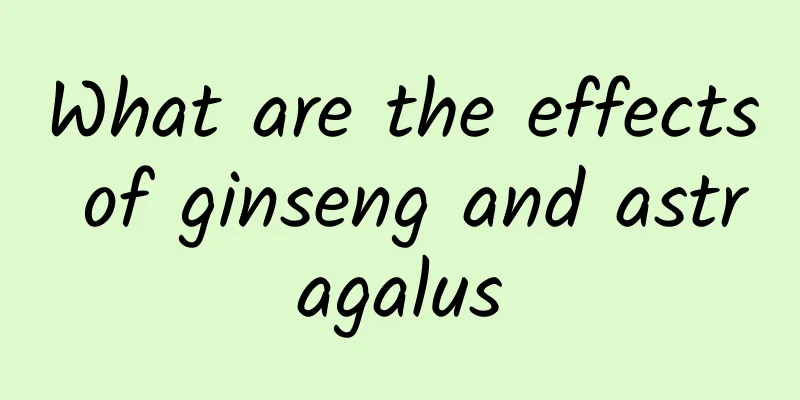What are the effects of ginseng and astragalus

|
Ginseng grows long and looks a bit like yam, but it has many whiskers. Ginseng is also a very nourishing food with good health effects. In ancient times, only the noble Huang family could eat ginseng. In ancient times, ginseng was given as a gift, which was enough to prove the efficacy of ginseng. In ancient times, many women had physical abnormalities and would choose astragalus to treat themselves when they got sick. So what are the effects of ginseng and astragalus? The effects and applications of Astragalus membranaceus mainly include the following four points: First, it can replenish qi and raise yang, and is good at lifting. It is often used to treat rectal prolapse, uterine prolapse, gastroptosis, kidney ptosis, metrorrhagia, dizziness and fatigue, or shortness of breath caused by qi deficiency and sinking, and is often used together with ginseng, atractylodes, cimicifuga, bupleurum, etc. The second is to consolidate the exterior and restrain sweat. It is mostly used for spontaneous sweating due to deficiency of the exterior. If the Wei Qi is not solid, sweating occurs, and there is exogenous wind evil, it can be used together with Fangfeng and Baizhu to consolidate the exterior and expel the evil. The third is to support the sores and drain the pus. It is often used for sores and carbuncles that have not ruptured for a long time, or sores and ulcers that are sunken, to promote rupture and limit the localization of sores. It can also be used for patients with weak qi and blood after ulcers have ruptured, and who have not healed the wounds for a long time. It has the effect of regenerating tissue and healing the wounds. It is often used in combination with honeysuckle, soapberry thorns, dandelion, etc. Fourth, it can promote diuresis and reduce swelling. It is often used to treat asthenic edema caused by poor circulation of Yang Qi. Astragalus can replenish Qi and strengthen the spleen, so that the spleen yang can be circulated and water can be discharged to reduce swelling. It can also be used for edema caused by various reasons and accompanied by qi deficiency, and is often used together with Stephania tetrandra, Poria cocos, Atractylodes macrocephala, etc. Ginseng tastes sweet and slightly bitter, and is slightly warm in nature; Astragalus tastes sweet and is warm in nature. Although both have the function of replenishing qi, the former is more powerful. In addition, ginseng has the effects of quenching thirst, promoting salivation and calming the mind, which are not available in astragalus. The qi-tonifying effect of Astragalus is far inferior to that of ginseng. However, Astragalus's tonic effect is more superficial. Its effects of raising yang, consolidating the exterior, supporting the interior, and promoting diuresis and reducing swelling are not found in ginseng. Since their functions are similar but different, they must be used differently. Ginseng is a great tonic for vital energy, as it can replenish qi and consolidate deficiency. Therefore, it is often used clinically to treat serious or long-term illnesses, or blood loss leading to qi loss resulting in shortness of breath, fatigue, general weakness, cold limbs, excessive sweating, and a weak pulse. This product can be used alone or together with aconite or astragalus. It also greatly replenishes vital energy and relieves asthma by nourishing the lungs and kidneys. For example, ginseng combined with walnut meat or ginseng combined with gecko can treat wheezing due to lung and kidney qi deficiency, or shortness of breath, low voice, weak pulse, etc. The tonic effect of ginseng lies in its good circulation in the middle burner, and it is also effective in strengthening the spleen and stopping diarrhea. For example, ginseng combined with Atractylodes macrocephala, Poria cocos, Amomum villosum, lotus seeds, yam, and Coix seeds can treat lack of energy, fatigue in the limbs, poor appetite, loose stools, and chronic diarrhea caused by spleen and stomach qi deficiency. Quenching thirst and promoting salivation is another benefit of ginseng. Therefore, in clinical practice, it can be used to treat the following diseases and symptoms: ① Heat disease damages the semen and causes high fever, thirst, sweating, damage to qi and depletion of fluid, and a large and weak pulse. It can be used together with heat-clearing and yin-nourishing drugs, such as ginseng with gypsum, Anemarrhena asphodeloides, etc. ② If febrile disease or summer heat damages the qi and fluid and causes excessive sweating, thirst and fatigue, or insufficient qi and fluid causes restlessness, insomnia, shortness of breath, spontaneous sweating, palpitations, and a thready and weak pulse, use ginseng with Ophiopogon japonicus, Schisandra chinensis, etc. We have introduced so much about the effects of ginseng and astragalus. I think everyone understands that when you take ginseng and astragalus, you must make reasonable arrangements for yourself. It does not mean that everyone can eat astragalus and ginseng. If you can't eat it, don't eat it, otherwise it will cause great harm to your body. Ginseng and astragalus also have the effect of curing diseases. If you lack qi and blood, you can eat astragalus and ginseng. |
<<: What are the effects and functions of cooked astragalus
>>: What Chinese medicine should I take for insufficient Qi and blood?
Recommend
Regarding the China Eastern Airlines crash, all this "information" is false!
Around 14:38 on March 21 China Eastern Airlines f...
"The Hunchback of Notre Dame", a tragedy caused by square dancing?
Hunzhi helps you read the famous book "Hamle...
These 5 risk factors can cause cells to become cancerous! To prevent them, try this →
In March 2023, the National Cancer Center and the...
Is artificial intelligence about to "awaken"? Experts give some advice!
In June 2022, a piece of news sparked a heated di...
The efficacy and function of small fruit wild grapes
There are many kinds of common Chinese medicinal ...
The most effective Chinese medicine for replenishing Yang Qi
Patients with yang deficiency will not know their...
Is white pollution difficult to solve? Try this "living" plastic!
Produced by: Science Popularization China Author:...
Special planning of the "Health from Food" series丨Beware of "diseases from the mouth", be careful when eating these foods
Did you know that common foods in our daily lives...
In the beginning, tea was not meant to be drunk!
Mixed Knowledge Specially designed to cure confus...
A positive case in Zhengzhou tested negative for nucleic acid for 12 consecutive times. How many nucleic acid tests should be conducted to ensure peace of mind?
Recently, a positive case in Zhengzhou tested neg...
Side effects of toad grass
Toad grass is a very common plant in rural areas ...
Here's a bet: you can't breathe in and talk at the same time!
Challenge! Try this: Breathe in while you speak. ...
Why are we descendants of the dragon? The truth is a big gossip!
Mixed Knowledge Specially designed to cure confus...
What are the medicinal values of carmine root?
What does the root of carmine flower look like? M...
The best in Shennong's Herbal Classic, also a secret of Chinese medicine
People often say: The secret of Chinese medicine ...









